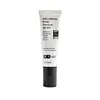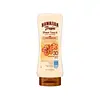What's inside
What's inside
 Key Ingredients
Key Ingredients

 Benefits
Benefits

 Concerns
Concerns

 Ingredients Side-by-side
Ingredients Side-by-side

Octocrylene 4.9%
UV AbsorberEctoin
Skin ConditioningAvena Sativa Bran Extract
AbrasiveBisabolol
MaskingButylene Glycol
HumectantButyloctyl Salicylate
Skin ConditioningCaffeine
Skin ConditioningCaprylyl Methicone
Skin ConditioningCitrus Aurantium Dulcis Peel Extract
Emulsion StabilisingCyclopentasiloxane
EmollientEthyl Ferulate
AntioxidantEthylhexylglycerin
Skin ConditioningHydroxyethyl Acrylate/Sodium Acryloyldimethyl Taurate Copolymer
Emulsion StabilisingOctyldodecyl Neopentanoate
EmollientOleth-3 Phosphate
PEG-7 Trimethylolpropane Coconut Ether
EmulsifyingPhenoxyethanol
PreservativePolyisobutene
Propanediol
SolventSilybum Marianum Seed Extract
Skin ConditioningSodium Hyaluronate
HumectantSodium Stearoyl Glutamate
CleansingTocopheryl Acetate
AntioxidantTriethoxycaprylylsilane
Water
Skin ConditioningOctocrylene 4.9%, Ectoin, Avena Sativa Bran Extract, Bisabolol, Butylene Glycol, Butyloctyl Salicylate, Caffeine, Caprylyl Methicone, Citrus Aurantium Dulcis Peel Extract, Cyclopentasiloxane, Ethyl Ferulate, Ethylhexylglycerin, Hydroxyethyl Acrylate/Sodium Acryloyldimethyl Taurate Copolymer, Octyldodecyl Neopentanoate, Oleth-3 Phosphate, PEG-7 Trimethylolpropane Coconut Ether, Phenoxyethanol, Polyisobutene, Propanediol, Silybum Marianum Seed Extract, Sodium Hyaluronate, Sodium Stearoyl Glutamate, Tocopheryl Acetate, Triethoxycaprylylsilane, Water
Homosalate 5.5%
Skin ConditioningEthylhexyl Salicylate 4.5%
UV AbsorberOctocrylene 4%
UV AbsorberButyl Methoxydibenzoylmethane 2%
UV AbsorberC12-15 Alkyl Benzoate
AntimicrobialCetearyl Alcohol
EmollientPhenoxyethanol
PreservativeVp/Eicosene Copolymer
Diisopropyl Adipate
EmollientNeopentyl Glycol Diheptanoate
EmollientMica
Cosmetic ColorantDimethicone
EmollientGlycerin
HumectantParfum
MaskingPolymethylsilsesquioxane
Acrylates/C10-30 Alkyl Acrylate Crosspolymer
Emulsion StabilisingCoco-Glucoside
CleansingMethylparaben
PreservativePropylene Glycol Dibenzoate
Skin ConditioningCeteth-10 Phosphate
CleansingDicetyl Phosphate
EmulsifyingPropylparaben
PreservativeSodium Hydroxide
BufferingDisodium EDTA
Paraffin
PerfumingXanthan Gum
EmulsifyingButyrospermum Parkii Butter
Skin ConditioningJojoba Alcohol
EmollientPotassium Jojobate
Skin ConditioningSimmondsia Chinensis Butter
Skin ConditioningMangifera Indica Seed Butter
Skin ConditioningPropanediol
SolventTocopheryl Acetate
AntioxidantCarica Papaya Fruit Extract
Skin ConditioningColocasia Antiquorum Root Extract
Skin ConditioningMangifera Indica Fruit Extract
Skin ConditioningPassiflora Incarnata Fruit Extract
Skin ConditioningPlumeria Acutifolia Flower Extract
Skin ConditioningPsidium Guajava Fruit Extract
AstringentPanthenol
Skin ConditioningAloe Barbadensis Leaf Juice
Skin ConditioningSodium Ascorbyl Phosphate
AntioxidantTitanium Dioxide
Cosmetic ColorantHomosalate 5.5%, Ethylhexyl Salicylate 4.5%, Octocrylene 4%, Butyl Methoxydibenzoylmethane 2%, C12-15 Alkyl Benzoate, Cetearyl Alcohol, Phenoxyethanol, Vp/Eicosene Copolymer, Diisopropyl Adipate, Neopentyl Glycol Diheptanoate, Mica, Dimethicone, Glycerin, Parfum, Polymethylsilsesquioxane, Acrylates/C10-30 Alkyl Acrylate Crosspolymer, Coco-Glucoside, Methylparaben, Propylene Glycol Dibenzoate, Ceteth-10 Phosphate, Dicetyl Phosphate, Propylparaben, Sodium Hydroxide, Disodium EDTA, Paraffin, Xanthan Gum, Butyrospermum Parkii Butter, Jojoba Alcohol, Potassium Jojobate, Simmondsia Chinensis Butter, Mangifera Indica Seed Butter, Propanediol, Tocopheryl Acetate, Carica Papaya Fruit Extract, Colocasia Antiquorum Root Extract, Mangifera Indica Fruit Extract, Passiflora Incarnata Fruit Extract, Plumeria Acutifolia Flower Extract, Psidium Guajava Fruit Extract, Panthenol, Aloe Barbadensis Leaf Juice, Sodium Ascorbyl Phosphate, Titanium Dioxide
Ingredients Explained
These ingredients are found in both products.
Ingredients higher up in an ingredient list are typically present in a larger amount.
Octocrylene protects skin from sun damage. It absorbs UV-B with peak absorption of 304 nm. It is a common sunscreen ingredient and often paired with avobenzone, a UVA filter. This is because octocrylene stabilizes other sunscreen ingredients by protecting them from degradation when exposed to sunlight. Octocrylene is a photostable ingredient and loses about 10% of SPF in 95 minutes.
Octocrylene also acts as an emollient, meaning it helps skin retain moisture and softens skin. It is oil-soluble and hydrophobic, enhancing water-resistant properties in a product.
Those who are using ketoprofen, a topical anti-inflammatory drug, may experience an allergic reaction when using octocrylene. It is best to speak with a healthcare professional about using sunscreens with octocrylene.
The EU allows a maximum of these concentrations:
Learn more about OctocrylenePhenoxyethanol is a preservative that has germicide, antimicrobial, and aromatic properties. Studies show that phenoxyethanol can prevent microbial growth. By itself, it has a scent that is similar to that of a rose.
It's often used in formulations along with Caprylyl Glycol to preserve the shelf life of products.
Propanediol is an all-star ingredient. It softens, hydrates, and smooths the skin.
It’s often used to:
Propanediol is not likely to cause sensitivity and considered safe to use. It is derived from corn or petroleum with a clear color and no scent.
Learn more about PropanediolTocopheryl Acetate is AKA Vitamin E. It is an antioxidant and protects your skin from free radicals. Free radicals damage the skin by breaking down collagen.
One study found using Tocopheryl Acetate with Vitamin C decreased the number of sunburned cells.
Tocopheryl Acetate is commonly found in both skincare and dietary supplements.
Learn more about Tocopheryl Acetate